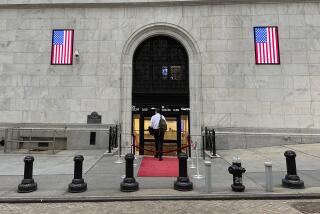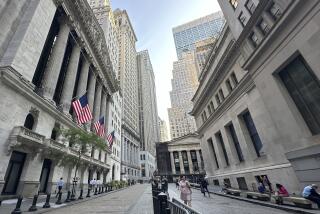HP to Purchase Rival Compaq Computer
- Share via
Computer giant Hewlett-Packard Co. announced that it would acquire rival Compaq Computer Corp.--a deal that would create the world’s largest PC company.
Experts heralded the move as the beginning of a long-awaited, and necessary, consolidation of the nation’s technology industry.
But Wall Street greeted the betrothal with an unusually harsh reaction: HP’s share price dropped 22% last week and Compaq’s 14%, reflecting deep pessimism about whether the merger would create a strong competitor to deal with the troubled future facing the technology sector. The chilly reception lowered the estimated value of the stock-only deal from about $25 billion when announced to less than $20 billion by week’s end.
Nevertheless, an HP acquisition of Compaq may be the catalyst that reshapes the industry into far fewer and larger players, experts said. Several large companies are so weakened by the market downturn that they could become prime acquisition targets.
Charles Piller
U.S. Unemployment Rate Surges to 4.9%
The U.S. unemployment rate surged to 4.9%--its highest level in nearly four years--as factories continued slashing jobs to cope with stumbling growth, the Labor Department reported.
The August rate, an increase from July’s 4.5%, remains historically low, but it was significantly higher than the expected 4.6% and sent economists and investors scurrying for cover. Analysts said the new numbers, which suggest the economy is even weaker than previously thought, could provoke the Federal Reserve to launch a new round of interest rate cuts.
Employers reported a loss of 113,000 jobs during the month; since the start of the year, the number of people at work in the nation has dropped by 1.6 million.
A Times Staff Writer
Stock Markets in Weeklong Tumble
Stock markets around the world began September with a thud, tumbling throughout the week as fears of a global economic slowdown continued to grip investors.
In the United States, the benchmark Standard & Poor’s 500 index fell beneath its low-water mark of last spring en route to its lowest close since October 1998. With the Dow Jones industrial average and Nasdaq composite index also suffering losses for the week, U.S. stocks are now in their longest bear market since 1973-74.
Corporate earnings warnings, dismal economic news--including a surprisingly bleak jobs report Friday--and a negative reaction to the proposed merger of Hewlett-Packard and Compaq all contributed to the declines.
European bourses fell in tandem with U.S. markets, some hitting three-year lows. Markets in Asia and Latin America also lost ground.
A Times Staff Writer
Japan’s Economy Is Closer to Recession
Japan reported that its gross domestic product contracted last quarter at an annualized rate of 3.2%. One more quarter of negative growth and the world’s second-largest economy will officially be in a recession.
The sharp fallout sent shivers through the country, which has been fighting recessionary forces for years.
In particular, the news makes the political tenure of reform-minded Prime Minister Junichiro Koizumi more vulnerable, analysts said, given the notoriously fickle electorate.
“Basically, the numbers show there’s nothing supporting the economy,” one economist said.
A Times Staff Writer
Regulators Reverse Microsoft Split-Up Plan
State and federal regulators abandoned their 16-month effort to split up the operations of software giant Microsoft Corp., saying they will seek a quicker but less dramatic resolution to the epic antitrust battle.
Justice Department officials said they will ask a federal court to impose restrictions on Microsoft’s business practices to prevent it from unlawfully using its monopoly power to hamper competition in the computer software business.
The reversal also may suggest that the Bush administration will take a far less aggressive approach than the Clinton administration to regulating technology and other industries.
As expected, the government said it will not pursue hearings to show that Microsoft violated additional antitrust laws by tying competitive products to its operating system software, which dominates the world computer market.
Joseph Menn
Greek Theatre’s Suitors Agree to Act Together
Two concert promoters who had been locked in a seething fight over the contract to operate Los Angeles’ city-owned Greek Theatre reached a potential truce last week.
Under the unusual arrangement, the two competitors, Nederlander Organization and House of Blues, would lump together the revenue and expenses of the Greek and a second venue, the House of Blues-run Universal Amphitheatre. The two firms would market concerts and sell tickets jointly, sharing profits and losses.
Some city officials protested that the arrangement reduced competition and left the city with only one bid.
Jeff Leeds
State OKs Rescue Bill to Rebuild Edison
The state Assembly narrowly approved a rescue bill for Southern California Edison that would allow the Rosemead utility to sell $2.9 billion in bonds to pay some of its debts.
The legislation returns to the Senate to be reconciled with a version passed in July. Any action must be taken by Friday, when the Legislature is scheduled to adjourn for the year.
SCE, a unit of Edison International, said the bill provides a path for returning the utility to credit-worthiness but leaves the utility at risk because about $1 billion in electricity debts will remain unpaid.
Consumer advocates vow to mount a referendum to overturn any Edison rescue.
Nancy Rivera Brooks
U.S. Charges 2 Tech Execs With Fraud
Federal regulators announced criminal and civil charges against former executives of software firm Indus International Inc., saying they fraudulently inflated the company’s financial results two years ago.
An arrest warrant was issued for the company’s former president and chief executive, and a former chief administrative officer pleaded guilty to one criminal charge. A third executive was not indicted but was sued by the Securities and Exchange Commission for alleged securities fraud.
The SEC and the Justice Department also are investigating several other Silicon Valley companies that may have succumbed to the temptation to cut corners during the technology boom of recent years.
David Streitfeld
Disney, Fox Join in Web Film Venture
Taking aim at cable TV middlemen and Internet pirates, Walt Disney Co. and News Corp. announced plans to deliver their films directly to consumers through broadband networks.
The new venture, Movies.com, will be the first outlet on the Net and on cable TV for live-action films from Disney’s studios and 20th Century Fox, a News Corp. subsidiary. The companies’ ambition is to strike licensing deals with rival studios and turn Movies.com into the leading video-on-demand service on cable, as well as the top online source of downloadable movies.
The real goal of the venture, analysts say, is to give Disney and News Corp. more leverage when negotiating deals with cable services and video stores.
Jon Healey
Trammell Unveils Plan for ABC Center Site
Officials at Trammell Crow Co. unveiled the proposed design for an office tower on Avenue of the Stars to open in 2005 that would replace the aging ABC Entertainment Center in Century City.
The central feature of the planned $280-million make-over of the site is an unusual 15-story office building with a 90-feet-by-110-feet opening in the middle. It also would include an adjacent park-like plaza flanked by restaurants and some type of cultural venue.
Architects at Gensler designed the project, which would replace the 29-year-old office buildings, stores, restaurants and Shubert Theatre. The theater will be closed in September 2002.
Brad Berton
*
Please see Monday’s Business section for a preview of the week’s events.







